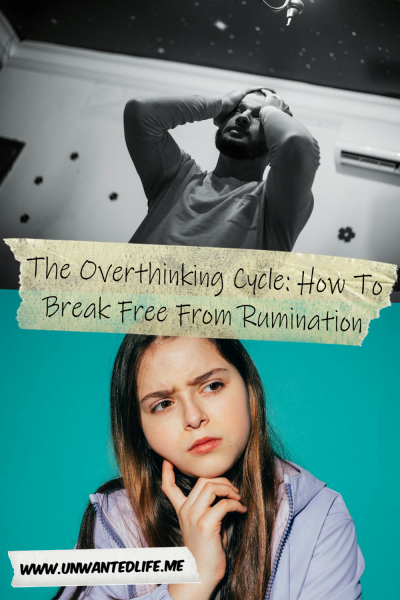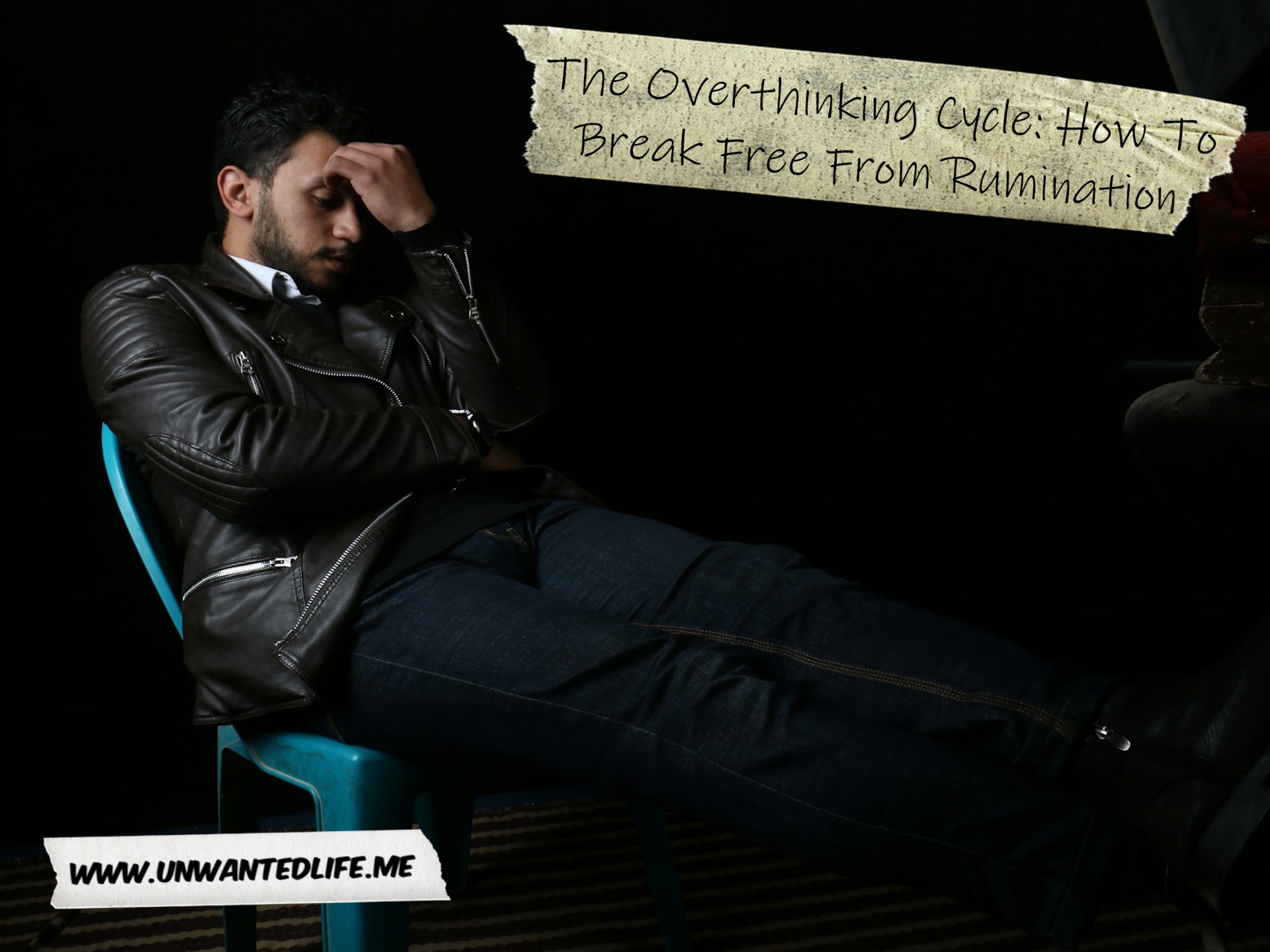One of the most common issues I deal with as a therapist, and have experience myself with my own mental health struggles, is overthinking. This one habit can go a long way to turning our mental health on its head. As such, I thought it’d make for a good topic for today’s article. Enjoy.
What Is Overthinking?
Overthinking in our brains annoying habit that causes us to dwell on certain thoughts, constantly anticipating a situation or negative outcome (Lamothe, 2024). Such unrelenting thinking, often characterised by repetitive negative intrusive thoughts or excessive analysis, can be draining and unproductive.
For the purpose of research, our overthinking is often split along the lines of rumination about the past and present, and worrying about the future (Sperber, n.d.). But for this article, this separation doesn’t matter.
What matters is how overthinking is harmful to our wellbeing and quality of life. When we overthink, we can quickly find ourselves trapped in a spiral of negative thinking. We can find ourselves fixated and over-analysing any and all situations, focusing on the problems rather than the solutions (Islam, 2024).
Our problem-solving brains are hard-wired for this kind of issue to develop, because evolution isn’t perfect. It’s actually how our brains try to find a solution (Sperber, n.d.).
Uncontrolled thinking is a common characteristic in mental health conditions like anxiety and depression, as well as featuring in stress (Aghata, 2024). No matter how many times I tortured myself by overthinking about my childhood, the racism, and the abuse, I couldn’t change anything. But it drove me closer and closer to wanting to take my own life.
This connection is so strong that if we can overcome our overthinking, then it does wonders for our recovery.
According to a study by Aghata (2024), Generation Z are increasingly having to deal with the problems of overthinking, as they’re more likely to feel depressed due to high self-expectations, uncertainty, and social demands. Of course, social media plays a role in this due to how easy it is to make comparisons.
The most familiar form of overthinking that we can all probably understand is regret. We’ve probably all experienced a situation where we wished we’d made a different choice or taken a different path in life (Sperber, n.d.), either personally experiencing that or seeing it played out in a film or TV show. Or perhaps because of the spotlight effect, we can’t stop recalling that one time when we felt we had embarrassed ourselves.
How To Overcome Overthinking
The loop of unproductive thoughts we call overthinking is, without a doubt, unnecessary thinking (Petric, 2018). So let’s break that cycle.
Triggers
It can be beneficial to make an effort to recognise our triggers by paying attention to what situations, emotions, or times of day tend to initiate overthinking. This is an ideal journaling task, as it easily allows us to then create solutions for what triggers us.
Self-esteem
Self-esteem is often linked to overthinking, so exploring and working on our self-esteem may help us have more faith in our abilities and judgment (Hope Therapy & Counselling Services, 2023). We could start by working on where we get our validation from, as a reliance on external validation isn’t healthy.
Problem-focused thinking
Our problem-solving brains are trying to solve a problem that often doesn’t exist, doesn’t matter, or we can’t do anything about. So if we find ourselves trapped in an overthinking doom loop, then ask ourselves, “How are these thoughts helping or hindering me?”
This should then give us two options once our awareness of our overthinking has clicked in. We can realise that what we’re stuck thinking about isn’t worth our time or focus, and switch our attention elsewhere, or we realise that we need to find the root cause of our overthinking, and thus come up with a plan to solve it (Sperber, n.d.).
For example, if we’re worried about money, and we ask ourselves, “Is this helping or harming us?”, then we might find that it doesn’t help us to think about it. Thus, if we sit down and work out a plan to secure our finances (budgeting, getting a loan, applying for benefits, etc.), the overthinking will reduce or even stop.
If a problem is fixable, if a situation is such that you can do something about it, then there is no need to worry. If it’s not fixable, then there is no help in worrying. There is no benefit in worrying whatsoever.
Take notice
Try to notice when we’re overthinking and mentally acknowledge that we’re, in fact, overthinking. Sometimes, this can be enough to break the cycle of thinking.
Thought challenges
When we have negative thoughts that we can’t let go of, cognitive behavioural therapy (CBT) teaches us to use techniques that can help challenge these thoughts (Hope Therapy & Counselling Services, 2023; and Islam, 2024), such as reframing and putting the thoughts on trial.
For example, if we make a mistake and we can’t stop thinking and feeling that we’re useless, this could be reframed by challenging the idea that a single mistake makes us useless. Thus, we could swap that thought to something like, “I may have made a mistake, but that’s normal; everyone makes mistakes. This doesn’t mean I’m useless”.
Self-expectations
In our digital world, it often feels we have to compete with everyone to be seen as perfect, which generates unhealthy expectations for ourselves (Aghata, 2024). These expectations then become things we can find ourselves overthinking as we try to be perfect.
Instead, we should try asking ourselves whether these expectations are realistic, achievable, and whether they even matter in the first place. After all, perfection is impossible, and social media isn’t real life.
Worry hour
While we might not be able to stop overthinking overnight, we can make it more containable. Creating time each week or even each day to deal with overthinking and other worries, whether to just journal about them or to problem-solve them, can help stop us feeling overwhelmed by it. After all, we’re not overthinking on purpose (Sperber, n.d.).
Time limits for decisions
If it’s a decision we’re trapped overthinking about, which is often referred to as decision paralysis, setting a time limit to make a decision can help us become unstuck (Islam, 2024). Another way to use this is to also set a certain amount of time to research for our decision, and remember that no decision is ever perfect (Hope Therapy & Counselling Services, 2023).

Mindfulness and grounding exercises
Grounding exercises are an easy way to switch focus to the present moment, helping us pull ourselves out of the overthinking loop we might find ourselves trapped in (Lamothe, 2024). The 5-4-3-2-1 technique is a common one used, but it can be as easy as holding an object in our hand and describing how it feels, if it’s heavy or not, what colour it is, etc. This is especially good for anxiety-related overthinking.
It can also be useful to practise day-to-day activities that can promote a mindful approach to life, such as breathing exercises, Pilates, yoga, and meditation (Hope Therapy & Counselling Services, 2023). Even mindfulness eating can be an easy way to do this.
Mindset
Overthinking often comes from a negative mindset (Islam, 2024), usually because of a maladaptive core belief, which will cause us to use cognitive biases. These biases shape how we see the world and ourselves, distorting everything through a negative lens. Therefore, learning how to focus on the positives more can help shift us to a more positive mindset and thus reduce overthinking.
Alternative outcomes
If we’re finding that we’re overthinking about the worst-case scenario, then looking for other possible outcomes can be helpful. If we also then consider what the most likely outcome would be, then even better.
Control
We can often find ourselves overthinking things when we’re in situations beyond our control, whereby the overthinking is an attempt to get that control back (Hope Therapy & Counselling Services, 2023). Instead, try to switch our minds to what we can control or influence, and let go of the things we can’t control or influence.
Seek support
If overthinking significantly impacts our daily life, relationships, or leads to distress, then seeking professional support is a good thing to consider.
Summary
Overthinking is a habit we’ve all experienced at one point or another, and a little overthinking isn’t necessarily a bad thing. But when it is, by consistently applying the strategies mentioned in this article, we can gain more control over our thoughts, reduce overthinking, and improve our overall wellbeing and quality of life. Otherwise, we may see our overthinking lead to the creation of mental health conditions like anxiety and depression.
As always, leave your feedback in the comments section below. Also, please share your experiences with overthinking in the comments section below as well. Don’t forget, if you want to stay up-to-date with my blog, you can sign up for my newsletter below. Alternatively, click the red bell icon in the bottom right corner to get push notifications for new articles.
Lastly, if you’d like to support my blog, please find the PayPal and Ko-fi donation payment options below. Until next time, Unwanted Life readers.
References
Aghata, A. (2024). The Phenomenon of Overthinking in Generation Z: A Cognitive Psychology Perspective. International Journal for Science Review, 1(1), 1-7. Retrieved from https://ijfsr.com/index.php/ijfsr/article/view/1/1 and https://doi.org/10.71364/ijfsr.v1i1.1.
Hope Therapy & Counselling Services. (2023, June). Counselling: 5 ways to stop overthinking. Counselling Directory. Retrieved from https://www.counselling-directory.org.uk/articles/5-ways-to-stop-overthinking.
Lamothe, C. (2024, July). 14 Ways to Stop Overthinking. Healthline. Retrieved from https://www.healthline.com/health/how-to-stop-overthinking.
Islam, M. T. (2024, September). Stopping Overthinking and Going with the Flow: A Path to Happiness. Retrieved from https://smartlifeskills.co.uk/stopping-overthinking-and-going-with-the-flow-a-path-to-happiness.
Petric, D. (2018). Emotional knots and overthinking. Research Gate. Retrieved from https://www.academia.edu/36836603/Emotional_knots_and_overthinking.
Sperber, S. (n.d.). Overthinking: Definition, Causes, & How to Stop. The Berkeley Well-Being Institute. Retrieved from https://www.berkeleywellbeing.com/overthinking.html.


Okay… I need this guide. Overthinking is one of my bad habits. Hahaha!!! I sometimes waste my precious time by sitting and thinking.
Nothing wrong with taking time to think, unless it’s because you’re overthinking something and it’s causing you harm
Great article! I love the tips; they are helpful. Putting a timer on my decision-making is a great idea. I am working on not being indecisive at times.
Thanks for commenting
This is a terrific post. Having been guilty of overthinking in the past, I see how these techniques would really help.
Thanks for commenting
I overthink all the time.